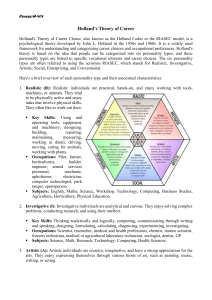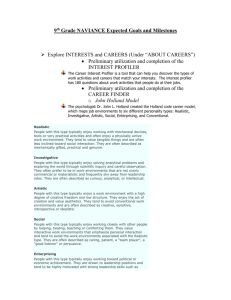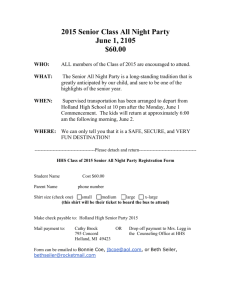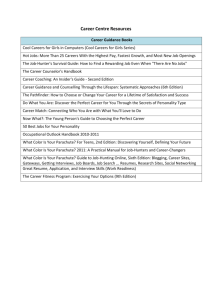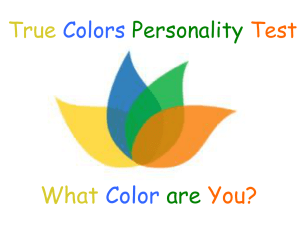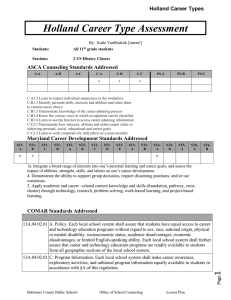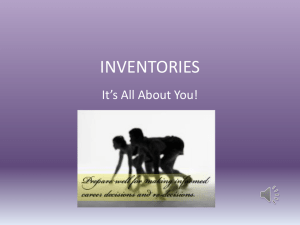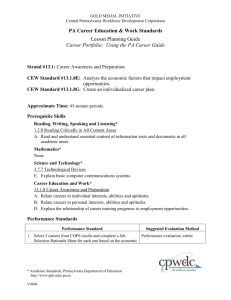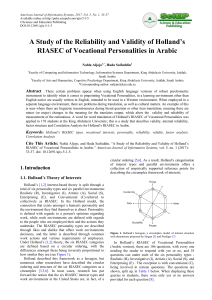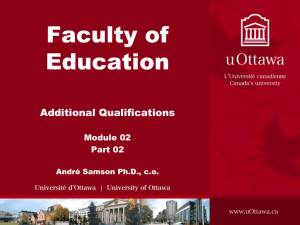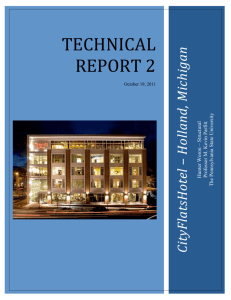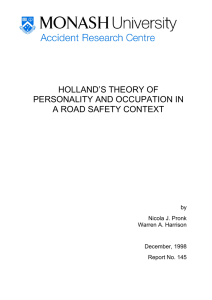Student Newsletter
advertisement
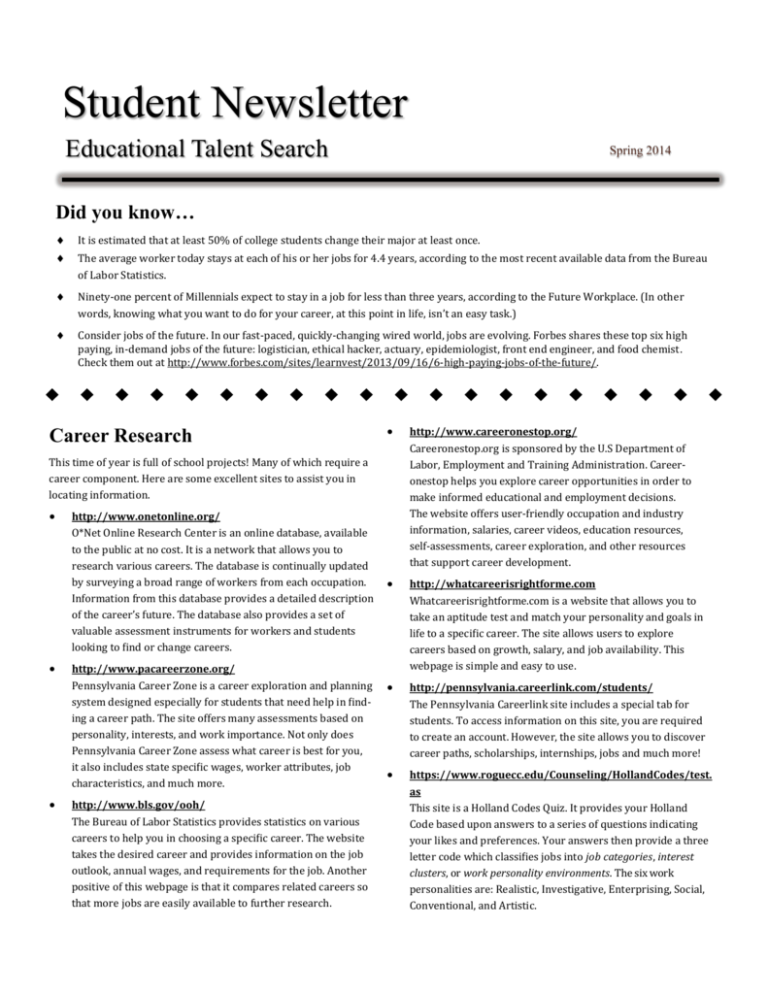
Student Newsletter Educational Talent Search Spring 2014 Did you know… It is estimated that at least 50% of college students change their major at least once. Ninety-one percent of Millennials expect to stay in a job for less than three years, according to the Future Workplace. (In other words, knowing what you want to do for your career, at this point in life, isn’t an easy task.) Consider jobs of the future. In our fast-paced, quickly-changing wired world, jobs are evolving. Forbes shares these top six high paying, in-demand jobs of the future: logistician, ethical hacker, actuary, epidemiologist, front end engineer, and food chemist. Check them out at http://www.forbes.com/sites/learnvest/2013/09/16/6-high-paying-jobs-of-the-future/. The average worker today stays at each of his or her jobs for 4.4 years, according to the most recent available data from the Bureau of Labor Statistics. Career Research http://www.careeronestop.org/ Careeronestop.org is sponsored by the U.S Department of Labor, Employment and Training Administration. Careeronestop helps you explore career opportunities in order to make informed educational and employment decisions. The website offers user-friendly occupation and industry information, salaries, career videos, education resources, self-assessments, career exploration, and other resources that support career development. http://whatcareerisrightforme.com Whatcareerisrightforme.com is a website that allows you to take an aptitude test and match your personality and goals in life to a specific career. The site allows users to explore careers based on growth, salary, and job availability. This webpage is simple and easy to use. http://pennsylvania.careerlink.com/students/ The Pennsylvania Careerlink site includes a special tab for students. To access information on this site, you are required to create an account. However, the site allows you to discover career paths, scholarships, internships, jobs and much more! https://www.roguecc.edu/Counseling/HollandCodes/test. as This site is a Holland Codes Quiz. It provides your Holland Code based upon answers to a series of questions indicating your likes and preferences. Your answers then provide a three letter code which classifies jobs into job categories, interest clusters, or work personality environments. The six work personalities are: Realistic, Investigative, Enterprising, Social, Conventional, and Artistic. This time of year is full of school projects! Many of which require a career component. Here are some excellent sites to assist you in locating information. http://www.onetonline.org/ O*Net Online Research Center is an online database, available to the public at no cost. It is a network that allows you to research various careers. The database is continually updated by surveying a broad range of workers from each occupation. Information from this database provides a detailed description of the career’s future. The database also provides a set of valuable assessment instruments for workers and students looking to find or change careers. http://www.pacareerzone.org/ Pennsylvania Career Zone is a career exploration and planning system designed especially for students that need help in finding a career path. The site offers many assessments based on personality, interests, and work importance. Not only does Pennsylvania Career Zone assess what career is best for you, it also includes state specific wages, worker attributes, job characteristics, and much more. http://www.bls.gov/ooh/ The Bureau of Labor Statistics provides statistics on various careers to help you in choosing a specific career. The website takes the desired career and provides information on the job outlook, annual wages, and requirements for the job. Another positive of this webpage is that it compares related careers so that more jobs are easily available to further research. Choosing a Career At some point in your high school years, you will be asked, “What do you want to do with your life?” Just hearing the question does not guarantee that you have an answer. Many students mistakenly believe that a career plan will suddenly pop into their head. Selecting a career requires time, energy, and a willingness to truly know yourself. Despite the effort involved, considering different career options is clearly beneficial. Students who have not planned for the future prior to graduation may be limited in their choice of colleges or in their choice of academic majors. Also, a lack of planning often results in poor motivation and wasting time and money until a career path and course of study are found. Students who have not considered different options and do not plan to attend college may be in worse shape. They may find themselves forced into low-paying jobs with little opportunity for training or advancement. In such a situation, they are likely to jump from job to job without ever developing a career path or experiencing satisfaction in the workplace. Given the importance of considering career options, it is good to know that the task does not have to be unbearable. There are some basic steps to follow which can make deciding on a career less painful and maybe even exciting. __________ Step 1: Become aware that a decision needs to be made. If you experience a sick feeling in the pit of your stomach when you think about life after high school, then you probably have some decisions to make. Begin by acknowledging that you do need to plan for the future and then make a clear statement of what that decision involves. __________ Step 2: Study yourself. This is one step which requires considerable energy on your part. There is a lot of information you need to learn about who you are. A few of the areas to consider are: __________ Step 3: Study your environment. Consider the geographic area where you live and compare it to your idea of the perfect place to live. Are the two places the same or are they different? How has school influenced you? Your teachers? Your church? Your family? Examining the information you gather about your environment can help you determine what sorts of things you value. For example, you might decide where you want to live, or the kind of people you want to work with. __________ Step 4: Generate a list of career possibilities and gather information. Begin your list by doing some preliminary research on as many career areas as you can. Be sure to note the type of work performed, the training required, expected salary range, and employment outlook. A good place to begin your research is the Occupational Outlook Handbook (OOH), available at www.bls.gov. After your preliminary research, choose the areas which interest you and research those areas completely. __________ Step 5: Select a career. From your list of career possibilities, choose one or two careers which seem to best suit your interests, abilities and values. Work to make a final selection, but understand that you can always consider other options or change your mind. __________ Step 6: Develop and implement a plan of action. Formulate goals, both short-term and long-term, which will enable you to realize the career option you have chosen. For example, a tenth-grader, set the short-term goal of earning a B in biology in order to advance to chemistry the following year. The long-term goal was to complete enough science courses to be accepted as a pre-med student when applying for college admission. __________ What are my interests? Step 7: Whenever necessary, review and repeat steps 1-6. What am I good at? You are always free to consider other career options and to change your mind. You may have selected a career, or even started working toward a career, only to find that it is not what you expected. This does not mean that you have done a poor job in planning your future, only that you may need to repeat some of the steps discussed here. What is important to me? If you have trouble answering these questions for yourself, be sure to ask your school guidance counselor or the ETS counselor for help. How Interests Impact Career Choices Have you ever noticed how in a social setting, people are usually attracted to others with similar interests? The belief that opposites attract may be true of magnets, but for people it’s a different story. If you are unsure whether you agree with the premise, think back to the last time you were with a group of people who didn’t respond to your interests. How does all of this relate to choosing a career? During your formative years, you develop unique interest patterns. Once these patterns develop, they determine your particular likes and dislikes. For example, some people love scientific investigation, while others hate it. Some prefer unstructured creativity, while others are attracted to structured activities such as record keeping. These interest patterns that develop as we mature define our personalities. Because your personality reflects your interests, you feel energized and enthusiastic when doing your favorite activities. Many people overlook these personal preferences in career planning. Instead, they look for practical skills to ensure success. However, success is unlikely unless skills are combined with activities you really enjoy. Having an opportunity to identify and assess your interests, allows you to plan a career that is realistic, enjoyable, and rewarding. The additional advantage in developing a career based on interests is the health benefit. People who enjoy their work tend to be healthier, both physically and emotionally, than those who don’t. Assessments which can help you identify your interests include, but are not limited to, the Strong Interest Inventory, the SelfDirected Search, the Personality Mosaic, and the computer based Discover Program. To get started, try the following exercise: South Seas Island Fantasy: Imagine you ar e flying an airplane on a day-long excursion. After flying a long distance, you find yourself hovering over six remote islands. Suddenly your plane develops engine trouble, and you are forced to land on one of the islands. Imagine that the diagram below is an aerial view of these islands. From the information available, you know that each island is populated by highly civilized and advanced people who have moved to these locations to associate with other compatible people and to enjoy the balmy climate. The people on each island share the characteristics described. You will be on the island for a long time and there is no transport between islands. Where you land determines who you will be staying with. Choose carefully and compare your choices to the chart on the next page. “S” “R” People who are frank and active, who like athletics or mechanical activities, and who prefer to work with things (machines, tools, objects, plants). “E” People who are extroverted and social who like to work with people to influence, persuade, lead, or manage them for organizational or economic gain. People who are friendly and skilled with words, who like to work with people to inform, enlighten, help, train, develop or cure them. “C” “I” “A” People who are intellectual and introverted, who like to observe, learn, investigate, analyze, solve complex puzzles, and work analytically with their minds. People who are individualistic, imaginative, and impulsive who like to work in unstructured situations using their imaginations and creativity. Borchard, K and Weaver, K. Your Career: Choices, Chances, Changes. DuBuque, Iowa: Kendall/Hunt Publishing Company. People who like to work with data (facts, figures, numbers) in structural settings and who are good at carrying out details or following through on instructions. What is RIASEC? Holland Codes and the abbreviation RIASEC refer to John Holland’s six personality types: Realistic, Investigative, Artistic, Social, Enterprising, and Conventional. The theory explains work-related behavior – such as, which career choices are likely to lead to job success and satisfaction. It also explains other human actions, such as success and satisfaction in school and training programs. It is the best known and most widely researched theory on this topic and is used by most career counselors. Understanding Holland’s theory will help you to make good choices – decisions about which occupations, careers, majors, or training programs best fit you. To understand your Holland Code, take the career test at http://personality-testing.info/tests/ RIASEC.php. The United States Department of Labor Employment and Training Administration maintains a database of occupations sorted by Holland Code. The list of occupations can be found at http://www.onetonline.org.
